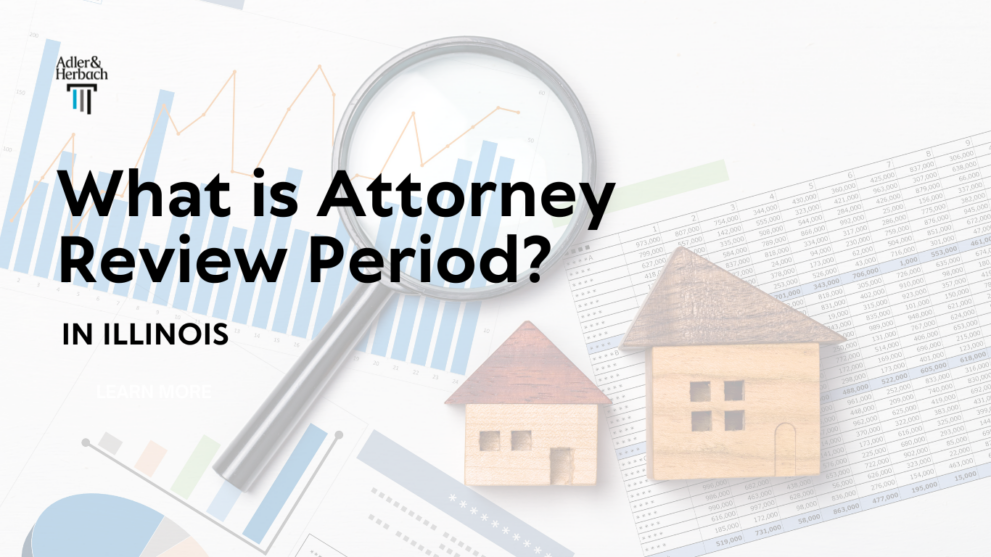What is the Attorney Review Period?
Attorney review is a critical stage in the transaction process, as it allows both parties to review, negotiate, and finalize the real estate contract terms before moving forward. During the attorney review period, both the buyer and seller have the opportunity to consult with their respective attorneys to ensure that their interests are protected.
This review process ensures that the terms of the contract are fair and reasonable and that both parties understand their obligations under the agreement.

Why is it Critical to the Real Estate Transaction Process?
Real estate attorney review is particularly important in Illinois because most contracts are initially completed by a real estate broker and signed before the attorneys have had a chance to review.
- This means that the first opportunity for an attorney to review the contract terms occurs after there is already a binding agreement in place.
- However, the attorney review period affords both the buyer and seller an opportunity to review all of the terms and conditions of the agreement with an attorney to ensure that their needs and interests are reflected in the contract.

For Buyers
Secure your dream home! Get advice from our expert legal team and ensure a seamless journey to the closing table.

For Sellers
Our legal team is here to help you finalize your real estate contract and get to closing!
Call now & Get a Free Consultation!
Special Offer: Mention this website and get a free consultation on your first service!
For example, if a buyer is purchasing a home in Illinois, they will want to make sure the contract contains an inspection contingency.
- During attorney review, the buyer’s attorney may review the inspection report and request repairs or a price reduction based on the findings.
- The seller’s attorney can accept or reject these requests, and negotiation may take place to come to a compromise.
- If both parties cannot come to an agreement, the transaction may not proceed.

How Does Attorney Review Work in Illinois?
During the attorney review period, which typically lasts 5 business days in Illinois, the buyer and seller have the opportunity to consult with their attorneys to review the terms of the real estate contract.
This allows both parties to identify any potential issues or areas of concern and negotiate any terms that they find unsatisfactory.
For example, let’s say the initial contract has a contingency for the buyer to obtain financing.
- During the attorney review period, the buyer’s attorney may review the language of the contingency clause and suggest revisions to protect the buyer’s interests better.
- The seller’s attorney may disagree with the revisions, and negotiations may take place to come to a compromise that both parties can agree on.
What Happens After Attorney Review period?
After attorney review, the buyer inspects the home, the attorneys approve the contract terms, both parties review and sign the final contract, earnest money is paid, title search is conducted, mortgage commitment obtained, and finally the closing happens for signing documents and transferring funds.
Step 1: Home Inspection
The buyer should have a licensed home inspector conduct a thorough inspection of the property to identify any issues that may need to be addressed before closing. If repairs are necessary, the parties may need to negotiate the terms of the repairs and the associated costs.
This step should be completed during the attorney review period so that any issues with the condition of the property can be resolved during the attorney negotiations.

Step 2: Attorney Approval Letter
After the attorney review period, the buyer’s attorney will issue an attorney approval letter indicating that the contract terms, together with any modifications agreed upon during the review period, have been approved. This letter is a significant milestone because it means that the attorney review clause has been satisfied, and the transaction can proceed.
Step 3: Final Contract Review
Once the attorney approval letter is received, the parties will review the final version of the contract to ensure that it reflects the agreed-upon terms. It is essential to review the document carefully to ensure that there are no errors or omissions.
Step 4: Signing the Final Contract
Once the final version of the contract is reviewed, both parties, or their attorneys, need to sign the document to indicate their acceptance of the terms.
Step 5: Paying Earnest Money
After the contract is signed, the buyer needs to pay the earnest money deposit. The amount of earnest money varies, but it is typically 1-5% of the purchase price. This money is held in an escrow account until the closing.
Step 6: Title Search and Title Insurance
The title company conducts a title search to ensure that the title is clear and there are no ownership issues, court judgments, or tenant leases that could affect the property’s ownership. The title company also provides title insurance after closing, which protects the buyer and lender from any unforeseen issues that may arise with the title in the future.
Step 7: Mortgage Commitment
If the buyer obtains financing, the lender will conduct an appraisal and issue a mortgage commitment. This commitment letter confirms that the lender is willing to provide the buyer with a mortgage loan to purchase the house.
Step 8: Closing
The final step in the process is the closing. The parties sign the final documents, including the mortgage, and the buyer pays the remainder of the purchase price. The seller signs the deed transferring ownership to the buyer, and the title company disburses the funds to the appropriate parties.

What Happens If The Deal Falls Through After Attorney Period?
In Illinois, after the attorney review period in a real estate transaction, both parties are usually eager to proceed to the next steps.
However, there are times when the deal may fall through even after the attorney review has been completed. This can be disappointing, but it’s important to know what happens in such situations.
Step 1: Review the Contract Provisions
The first step is to review the contract provisions to determine the reasons for the deal falling through. The contract provisions will often outline the next steps to take in the event that the deal falls through, so it’s essential to read them carefully.
Step 2: Understand Your Options
If the deal falls through after the attorney review period, you have several options. You can:
- Negotiate a new contract with the other party
- Renegotiate the existing contract
- Terminate the agreement entirely
Step 3: Negotiate a New Contract
If both parties are still interested in the transaction, they can negotiate a new contract with the assistance of their attorneys. This new contract will outline the updated terms of the deal and will need to be approved by both parties.
Step 4: Renegotiate the Existing Contract
Alternatively, the parties can renegotiate the existing contract to address the issues that led to the deal falling through. For example, if the buyer’s financing fell through, the parties can renegotiate the financing terms to accommodate the buyer’s situation.
Step 5: Terminate the Agreement
If the parties cannot come to an agreement, the deal can be terminated. This means that the parties will no longer be obligated to proceed with the transaction.
However, the earnest money deposit may not always be refunded, so it’s important to review the contract provisions regarding the deposit.

Step 6: Address Any Outstanding Issues
In some cases, there may be outstanding issues that need to be addressed before the deal can be terminated or renegotiated.
For example, if there are title issues, they will need to be resolved before the transaction can proceed.
Step 7: Seek the Assistance of an Experienced Real Estate Lawyer
Navigating the aftermath of a failed real estate transaction can be overwhelming, which is why it’s important to seek the assistance of an experienced real estate lawyer. They can help you understand your options and guide you through the process.
What can go wrong After the Attorney Review period and How are They Resolved?
Post-attorney review, real estate transactions may face issues such as financing problems, inspection results, title concerns, appraisal complications, or contract disagreements. These can be resolved by renegotiating terms, making necessary repairs, remedying title issues, adjusting the purchase price, or reaching a mutual agreement. If solutions aren’t reached, the buyer may terminate the agreement or the contract may not proceed.
Why is Having an Experienced Real Estate Attorney Essential to the Attorney Review Process?

Experienced real estate attorneys play a critical role in the attorney review process in Illinois. Here’s why:
- Expertise in Real Estate Law: Real estate law is complex, and an experienced attorney can provide invaluable guidance on issues like contract terms, title issues and property disclosures.
- Protection of Your Interests: An attorney’s primary role is to ensure that your interests are protected in a real estate transaction. They will review the contract thoroughly and identify potential issues, making sure that the contract terms are fair and reasonable.
- Negotiation Skills: Negotiating terms with the other party is an essential part of the attorney review process. An experienced real estate attorney can skillfully negotiate on your behalf to ensure that you get the best deal possible.
- Timely Completion of Transactions: A real estate attorney can help ensure that the transaction proceeds smoothly and quickly. They can help identify any potential issues and resolve them before they cause delays.
- Handling of Disputes: Sometimes disputes arise during the attorney review process. An experienced real estate attorney can help resolve these issues, ensuring that the transaction proceeds smoothly.
Call now & Get a Free Consultation!
Special Offer: Mention this website (Northsidelegal.com) and get a free consultation on your first Real estate attorney service!
For example, suppose a buyer enters a real estate contract without an attorney and later discovers an issue with the property’s title.
- In that case, they may be responsible for resolving the issue on their own, which can be costly and time-consuming.
- An attorney can identify these issues during attorney review and help the client negotiate a resolution that is in their best interest.
Attorneys can also help clients negotiate inspection results and request repairs or a price reduction.
- Suppose the buyer and seller cannot agree on the inspection results’ interpretation. In that case, an attorney can help mediate the dispute or recommend third-party mediation.
In Conclusion
Having an experienced real estate attorney during the attorney review process can save clients time and money in the long run. Attorneys can help identify and resolve issues before they become bigger problems, negotiate favorable contract terms, and ensure that their client’s interests are protected throughout the transaction.

